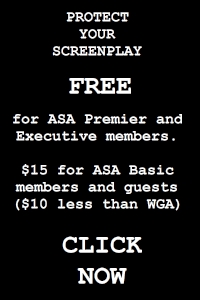By Jim Cirile,
CEO/Founder of Coverage Ink.
Every year I moderate the Agents/Managers Hot Sheet panel at Scriptfest (aka Pitchfest), which is always a ton of fun and super informative -- hearing how it really is from the tops reps in the biz, that’s pure freaking gold. Two years ago I asked the panel, what do you say to your feature clients who may be considering writing for TV? Magnet Management’s Mitch Solomon’s response: “I say, ‘Do you like money?’”
What a great answer, and it’s stuck with me for a couple reasons. When I came up in the ‘90s, there was a clear division between TV and features. Feature writers looked on writing TV as slumming, while TV writer/producers were fiercely protective of their space -- good luck getting anywhere with your spec pilot unless you’ve paid your dues by clawing your way up in TV production. But like the Berlin Wall, the battlements separating TV and features have toppled, and now we seldom define writers as TV or feature-specific -- we’re just writers, full stop. Feature writers write pilots; TV writers write features.
And so much the better, because as you likely know, we are in a new golden age of television. The bread and butter of most working writers used to be feature assignments and rewrites, and the writers with the mid-level quotes made a good living doing a couple of those per year. But as the studios consolidated and made less movies and put less and less material into development, they also started further screwing us by paying less. Writers whose quote was $250K were now forced to take WGA minimum plus 10%, in a one-step deal instead of two or three. Poof -- a heap-ton of writer income evaporated faster than a puddle of spittle in the Gobi.
Fortunately, TV rode to the rescue. Great new shows -- Dexter, The Sopranos, and their ilk -- redefined what TV could do, and made writing for TV cool again, and the arrival of new outlets hungry for content like Netflix, Hulu, and Amazon, created a perfect storm. The paydays may not be as big as on the features side, but they are abundant. And so when Mitch says, “Do you like money?,” what he means is: there’s opportunity out there -- but not so much in features. Oh, sure, you can still sell a feature spec -- provided it’s brilliant, makes the Black List, and has a producer with a studio deal and hopefully some A-list names attached. And that director who blew everyone away with his Sundance movie. Oh yeah, and if it’s based on really well-known public domain IP or successful source material.
Or you can write a pilot.
So how do you get your piece? You need these three things:
1) Craft. As with every other business, jobs are awarded to the people who know their stuff. Take classes. Read books. Get your hands on some TV scripts. Understand how they’re structured. Master the art of snappy and concise storytelling (yes, that single sentence may well take years. Remember, you want to get paid for your work. That means you have to be throwing serious heat.) Get professional feedback on your material from people who know what they’re doing. Work with a coach. Watch “Breaking Bad,” perhaps the greatest TV series of all time, over and over and over again. Learn subtext. Develop your material with a writers group or partner. Don’t expect miracles overnight. Your podiatrist went to school for a long time before she was able to hang up a shingle. Why should being a writer -- a similarly highly paid, professional job -- be any less rigorous?
2) Material. As with features, there are certain types of material that are easier to interest folks in than others. Sitcoms and period dramas are tough sells. Why? Because most sitcoms come from known quantities with a proven track record. Period = expensive, and while there are plenty of these shows out there, they’re viewed as more difficult to mount. What’s in demand? 1-hour dramas, procedurals with an unusual slant, sci-fi, action, thrillers, anything with a truly oddball or quirky main character, crime, and genre mash-ups. No superheroes. No serial killers. Doctors, lawyers and cops? Well, they’re always in demand by network, but you have to find a fresh, exciting way in.
3) Access. Once your chops are where they need to be, and you’ve got the killer pilot script, how do you get noticed? This is actually the easiest part. The mistake most people make is skipping right to #3 without nailing #1 and #2. The truth is, once you have the goods, people will champion you. There are so many ways to get read nowadays -- contests like Tracking B, Scriptapalooza, Launch Pad, and our own Get Repped Now promotion, break people all the time. There’s the Black List and numerous TV fellowship programs, all searching for the best and brightest. And there are Pitchfests and Virtual Pitchfests, all of which give you instant, one-on-one access. If you are ready, and your material is shiny, tight and awesome, you WILL break in. It’s that simple. People are desperate to find great new talent.
Do you like money? Then you need to master #1 and #2. Those are the tricky bits. Go get ‘em.

Jim Cirile is a writer/producer and the owner of www.coverageink.com, the oldest screenplay analysis, development, and editing company in Los Angeles. For a decade he wrote the “Agents Hot Sheet” column for “Create Screenwriting” magazine.




 Sell Your TV Concept Now
Sell Your TV Concept Now
 Posted in
Posted in  Tags:
Tags: 
